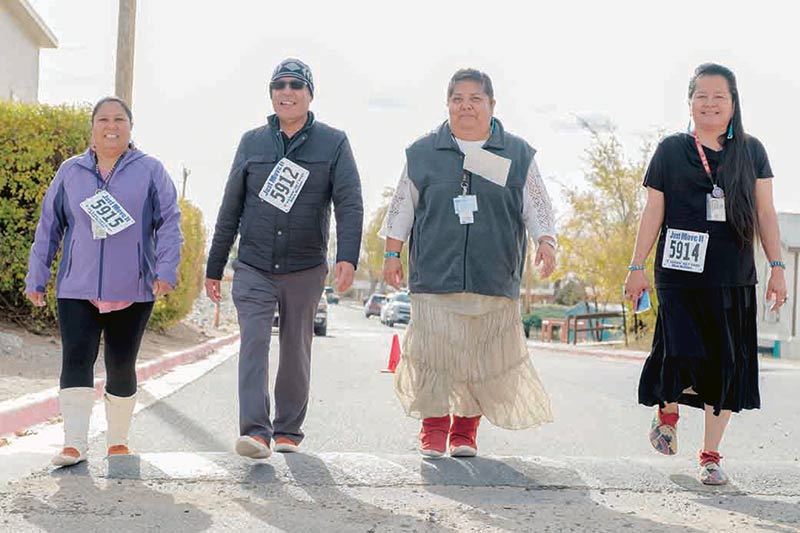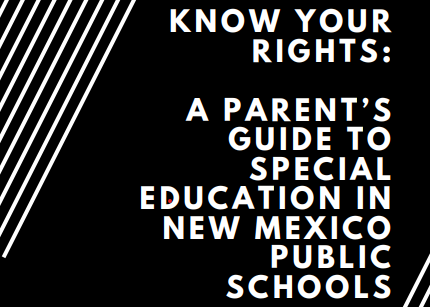navajo nation laws
The applicable laws on the Navajo Nation are:
- Navajo Nation Civil Rights of Individuals with Disabilities Act of 2018 and amendments to the Navajo Preference in Employment Act
- Navajo Nation Adult Guardianship Act of 2014
- Άlchíní Bi Beehaz ánnii Act of 2011 (dependency, children in need of supervision, delinquency, abuse/neglect, and Indian Child Welfare Act provisions)
- Navajo Nation Rules of Civil Procedure (governs procedure in the tribal district and family courts)
The above laws mostly incorporate federal disability laws and largely do not invoke the spirit of tribal fundamental laws, which would rely on complex communal/family-based effort and support that cannot easily be translated into English language "rights."
federal laws
Americans with Disabilities Act of 1990 (ADA). Federal law recognizes the sovereign authority of Native American tribes to govern themselves under its own laws, and it is generally understood that the ADA does not apply to Native American tribes. However, whether federal disability civil rights laws like the ADA apply to tribes should be understood on a Title-by-Title basis.
Section 504 of the Rehabilitation Act of 1973: Section 504 prohibits discrimination on the basis of disability in any program or activity that receives federal financial assistance. "The term 'program or activity' means all of the operations of a department, agency, special purpose district, or other instrumentality of a State or of a local government" and includes educational agencies and Indian Tribes which have an agreement to conduct a vocational rehabilitation program with a State agency. Failure by tribes to follow the mandates of Section 504 may result in the revocation of federal funding.
Architectural Barriers Act of 1968 (ABA): The Architectural Barriers Act requires that buildings and facilities that are designed, constructed, or altered with federal funds comply with Federal standards for physical accessibility. Tribal buildings and facilities designed, built, or altered with the use of federal funds must comply with the Uniform Federal Accessibility Standards (UFAS).
Individuals with Disabilities Education Act (IDEA): The IDEA provides funds to help schools (K-12) provide "a free, appropriate public education" in "the least restrictive environment" to children with disabilities. The Bureau of Indian Affairs (BIA) distributes IDEA funding to tribal schools and provides the procedural safeguards and administrative processes through their Office of Indian Education Program. In order to receive IDEA funds, BIA-funded schools must demonstrate that they have special education, policies, procedures and programs that are consistent with the BIA's standards.
The IDEA also applies to early intervention services. Infants and toddlers with disabilities (birth-2) and their families receive early intervention services under IDEA Part C. Children and youth (ages 3-21) receive special education and related services under IDEA Part B.
Fair Housing Act (FHA): The FHA prohibits discrimination in the sale, rental and financing of dwellings based on race, color, religion, sex or national origin, familial status, and disability. In addition to prohibiting discrimination on the basis of disability, the FHA contains design and construction accessibility provisions for certain new multifamily dwellings. According to HUD, the requirements of the FHA do not apply to Indian Tribes and their tribally designated housing agencies (TDHEs) for housing funded by the Native American Housing Assistance and Self-Determination Act of 1996 (NAHASDA). However, these funds trigger the accessibility requirements of Section 504 of the Rehabilitation Act.
- Title I (EMPLOYMENT) specifically excludes an "Indian Tribe" from the definition of an employer. This means that any employment discrimination suit against a tribe or its officials under Title I will likely be dismissed for lack of subject matter jurisdiction by the courts.
- Title II (STATE & LOCAL GOVERNMENTS) makes no mention of "Indian Tribes" in defining "public entities." while otherwise clearly defining its applicability to programs, services, and activities run by state and local governments,
- Title III (ACCESSIBILITY OF PUBLIC ACCOMMODATIONS) makes no mention of applicability to "Indian Tribes." However, if there is a pattern of discrimination or the discrimination raises an issue of general public importance, Title III allows the Attorney General to bring a civil lawsuit to compel a tribe's compliance with the statute. Therefore tribal-owned businesses should seriously consider complying with Title III or risk facing various penalties brought by the United States. (Note that Navajo Nation law also requires public accommodations to have disability access).
Section 504 of the Rehabilitation Act of 1973: Section 504 prohibits discrimination on the basis of disability in any program or activity that receives federal financial assistance. "The term 'program or activity' means all of the operations of a department, agency, special purpose district, or other instrumentality of a State or of a local government" and includes educational agencies and Indian Tribes which have an agreement to conduct a vocational rehabilitation program with a State agency. Failure by tribes to follow the mandates of Section 504 may result in the revocation of federal funding.
Architectural Barriers Act of 1968 (ABA): The Architectural Barriers Act requires that buildings and facilities that are designed, constructed, or altered with federal funds comply with Federal standards for physical accessibility. Tribal buildings and facilities designed, built, or altered with the use of federal funds must comply with the Uniform Federal Accessibility Standards (UFAS).
Individuals with Disabilities Education Act (IDEA): The IDEA provides funds to help schools (K-12) provide "a free, appropriate public education" in "the least restrictive environment" to children with disabilities. The Bureau of Indian Affairs (BIA) distributes IDEA funding to tribal schools and provides the procedural safeguards and administrative processes through their Office of Indian Education Program. In order to receive IDEA funds, BIA-funded schools must demonstrate that they have special education, policies, procedures and programs that are consistent with the BIA's standards.
The IDEA also applies to early intervention services. Infants and toddlers with disabilities (birth-2) and their families receive early intervention services under IDEA Part C. Children and youth (ages 3-21) receive special education and related services under IDEA Part B.
Fair Housing Act (FHA): The FHA prohibits discrimination in the sale, rental and financing of dwellings based on race, color, religion, sex or national origin, familial status, and disability. In addition to prohibiting discrimination on the basis of disability, the FHA contains design and construction accessibility provisions for certain new multifamily dwellings. According to HUD, the requirements of the FHA do not apply to Indian Tribes and their tribally designated housing agencies (TDHEs) for housing funded by the Native American Housing Assistance and Self-Determination Act of 1996 (NAHASDA). However, these funds trigger the accessibility requirements of Section 504 of the Rehabilitation Act.
disability legal ASSISTANCE & resources
Navajo Nation
Native American Disability Law Center - INTAKE PHONE No. (505) 566-5880
The NADLA pursues protection and advocacy for Native Americans, primarily on the Navajo Nation and New Mexico in tribal and state courts. NLADA also serves as a Benefits Enrollment Center (BEC), we serve Native American elders (65+) and adults with disabilities (21+). We screen them to see what benefits they maybe eligible for such as Low Income Home Energy Assistance Program (LIHEAP), Supplemental Nutrition Assistance Program (SNAP), Medicaid, and Medicaid Savings Program (MSP). Phone: (505) 566-5880 (Farmington, NM).
DNA People's Legal Services - NEW INTAKE PHONE No. (833) 362-1102
DNA is an acronym for the Navajo phrase Dinébe’iiná Náhiiłna be Agha’diit’ahii which means “attorneys who work for the economic revitalization of The People”. It maintains offices in Chinle, Ft. Defiance, and Tuba City on the Navajo Nation, in Keams Canyon on the Hopi reservation, in Dulce on the Jicarilla-Apache reservation, and in Flagstaff and Farmington just off-reservation, providing free civil legal services to low-income people who otherwise could not afford to hire an attorney. It helps people living in poverty use existing policies and laws to protect their property and assets, stay safe from physical, mental and financial abuse, avoid exploitation and safeguard their civil rights.
Navajo Family Voices - INQUIRIES Please Call (505) 226-3073
With one part-time on-staff attorney licensed to practice in New Mexico and the Navajo Nation, Navajo Family Voices provides limited legal information and assistance in drafting plans and documents for the courts of the Navajo Nation. Please contact us with your service need. Ahee'hee.
Arizona
The Arizona Developmental Disabilities Planning Council provides an easy to use Legal Options Manual that is an essential help to comprehensive planning.
ACDL is Arizona’s Protection and Advocacy organization. The ACDL worked with the Arizona Developmental Disabilities Planning Council to the Legal Options Manual that is an essential help to comprehensive planning.
New Mexico
New Mexico Legal Aid provides free services to eligible low-income New Mexico residents with civil (non-criminal) matters. Our services range from education, advice and brief services, to full representation in some cases. No one is denied access on the basis of race, age, gender, religion, political affiliation, beliefs, or disability. Click on the below image for a handbook prepared by New Mexico Legal Aid -- Know Your Rights: A Parent's Guide to Special Education in NM Public Schools.
The ARC is a non-profit offering help on NM guardianships, disability savings (ABLE) accounts, and serving as representative payee and trustee of master trusts. Phone: (505) 883-4630 (Albuquerque). Please note that the ARC does not do Navajo Nation guardianships.
DRNM is New Mexico's protection and advocacy program. Phone: (505) 256-3100 (Albuquerque).
Located in Albuquerque, EPICS provides free regular community trainings tailored to Native American families of children with disabilities to help you navigate your rights. Scholarships are available for travel and registration. Most trainings are held in Albuquerque.



